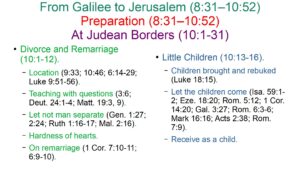Jesus from Galilee to Jerusalem
Mark 8:31–10:52
Preparation
First Prediction of Death and Resurrection (8:31).
The Kingdom is Near (1:15; 9:1)
Final Events in Galilee (8:31–9:50).
Second Prediction of Death and Resurrection (9:31)
Kingdom Has Small Beginnings (4:3-32; 10:29-31)
At Judean Borders (10:1-31).
Divorce and Remarriage (10:1-12).
Children brought and rebuked.
There is no indication who brought the children [the antecedent of “they”].
The last noun is “disciples,” but since they rebuked the ones who brought the children, it is very unlikely they rebuked themselves over this.
These are likely the parents or guardians of the children, as they were listening to Jesus with their families.
The word “brought” also carries with it the idea of bearing or carrying.
Since Luke’s account (18:15) says that infants were included here, that’s not surprising.
Why these parents (presumably) wanted Jesus to touch these kids is unclear.
It’s probable they wanted Him to bless their children, calling God’s favor upon them.
The disciples, in a strange display, rebuked those who brought the children.
It’s true, children can be unpredictable, especially little children, having no concept of personal space and constantly wanting attention.
While I loved my time subbing in pre-K and kindergarten, that part of it can get aggravating, particularly when you are “not in the mood.”
On top of that, for the infants, it’s not like they’ll ever remember this anyone, so what’s the point?
Perhaps the disciples thought Jesus didn’t need that aggravation or couldn’t be bothered with people who won’t remember anyway, so they tried to send them away.
Instead, He did not like what His disciples were doing, and urged the children to return.
Let the children come.
Jesus invites children, wants children to come to Him.
Some like to take this half of the verse in isolation, saying that if we deny infant baptism then we are keeping them away from Jesus.
That implies several things: 1) that children do not already have a relationship to Him, 2) that they are separated from Him by sin, 3) baptism is the only way for them to have a relationship with Him, and 4) only baptism is needed for them to have a relationship with Him.
We’ll forget for a moment that the vast majority of denominations that baptize infants don’t really baptize infants, they pour water on them.
We note, that all four of those implications is false (with one caveat).
Sin does in fact separate us from God (Isa. 59:1-2), but separation also implies we were once united with God.
“Sure,” they’ll say, “we were once united before Adam sinned.”
Which then implies sin is inherited—which it isn’t (Eze. 18:20).
We do inherit the curse of sin, that is death (Rom. 5:12), but not its guilt.
In fact, Jesus states this very thing: “of such is the kingdom of God.”
This no doubt refers to the innocence of these children, along with their humility and joy (1 Cor. 14:20).
As for that one caveat, it is true that when we have been separated by sin, then we must be baptized in order to have that relationship with God—to be in Christ (Gal. 3:27; Rom. 6:3-6).
The problem is, this passage does not mention baptism or anything like it.
At the same time, baptism alone cannot save us. If a baby cannot believe, it does not need to be baptized. Only when we have believed, repented, and been baptized will salvation come (Mark 16:16; Acts 2:38).
If one cannot believe, he does not need to be saved. Why? Because he is safe.
At the same time, can an infant sin? As one Calvinist, Voddie Baucham, said, “One of the reasons that God makes human babies small is so they won’t kill their parents in their sleep. They’re evil.” “Vipers in diapers” he calls them.
Obviously this is false—an infant cannot sin, so what does it need to repent of? If there is no sin, there is no separation from God and no need for baptism. The baby can neither sin nor believe. Again, it is safe!
“Those who don’t believe in original sin don’t have children,” they’ll say. And I’ll say it’s so sad those children don’t have parents that understand them or even try to understand them.
At what point does the child need to be thinking about these matters? As Paul said, “I was alive once without the law, but when the commandment came, sin revived and I died” (Rom. 7:9).
When was he without the law? Before he was accountable to it. When did the commandment come to him? When he was accountable to it.
So, it is when he is old enough or able to understand the law, to know right from wrong, to have a conscience, to do what’s right.
Receive as a child.
How can we receive the kingdom of God as a child?
What do children have that we don’t? Or better yet, what do we have that they don’t?
Lots of things, really. As I mentioned before, they have no sense of personal space, always demanding attention—in truth some adults are like this.
When you give a child a gift, what is their reaction? My son just had his 2nd birthday just a few weeks ago. He loved everything he opened up, with wonder and joy. Granted after we showed him a new present, he forgot about an older one. But then, at least for the smaller things, he hates it when his sister is playing with it. And my daughter hates it when he’s playing with her toys.
In any event, the toy is received with open arms, loved, and vigorously defended. That’s how we should receive the kingdom of God, the Lord’s church.
Jesus then blessed the children, doing just as their parents desired.
Rich young ruler (10:17-22).
Jesus then leaves the house He was in and a man comes running and kneels before Him.
We find out later that this is a rich man, Matthew and Luke reveal that he is also a young ruler—what he is ruling we do not know and it is not important for this event. In any event, this is why we call him the “rich young ruler.”
He probably had a degree of fame about him, though, and he still humbles himself before Jesus by kneeling before Him.
It is clear he recognizes Jesus as some sort of authority, asking Him the most important of questions: “what shall I do that I may inherit eternal life?”
He’s not asking for a miracle, but for an answer.
Like any good Bible teacher, He directs this man to the Source, but before He does, He establishes His authority further.
It’s clear this young man believed Jesus to be an authority, but Jesus wanted to drive this home: “Why do you call Me good? No one is good but One, that is, God.”
Jesus is basically saying: “You believe I am a Good Teacher. Only God is good. So, did you really mean what you just said?”
The idea of only God being good is a common understanding among Jews at this time, and is evident in Paul’s writings, particularly Romans 3:9ff, where Paul quotes a litany of OT passages to prove his point.
Later, the young man shortens it to “Teacher.” Whether or not this is a sign that he corrected himself is uncertain. I think it more likely he did so for brevity’s sake.
So, Jesus directs this rich young man to the Scriptures just as He did to the Pharisees when they asked about divorce. Whenever we have a spiritual or a moral question, we don’t need a prophet or a voice from heaven to answer us because they already did!
Jesus goes through several of the Ten Commandments: 7th, 6th, 8th, 9th, and 5th.
There is the additional mention that is not a direct quote from the OT: “Do not defraud.” So is that an OT command, and did Jesus misquote something?
If you have been following along in our series on Leviticus, you’ll know that defrauding God and man was wrong. When they did violate this command, the trespass offering was to be performed which included a restoration of the thing defrauded plus one-fifth (Lev. 5:14–6:7).
In any event, this man reveals that he has done this from his youth. No doubt he was taught the commands of God and obeyed them, but he had a problem.
Jesus could immediately identify what this man lacked—he trusted in his riches more than he should have. He did not have a healthy relationship with his wealth.
Jesus tells this man what he must do, but before He does, I want you to notice something—He loved him; Jesus loved this man. It was evident that Jesus cared for him.
For us, when someone must hear a hard truth, do we share that out of a genuine love for them. Do they know that we love them? Are they convinced of it? Hearing such hard truths is much easier to take from someone we know loves us and cares about us. That’s why our benevolence, offering encouragement, and developing a family atmosphere are so important, to show others that we love them when we might need to share something uncomfortable with them as Jesus did here.
Jesus didn’t have a lot of time to develop a relationship with that man, but somehow it was evident that He loved him.
Here He relays to him the cost of discipleship. Recall what Jesus said about that cost in 8:34-38 and the cost of escaping hell in 9:43-48.
Some would lose their eyes, hands, and feet, some would even lose their lives.
What are we willing to give up for heaven? An unlawful spouse? Our riches?
This is not a command for all mankind—there are rich people in the church age mentioned in Acts and addressed in many letters.
But let’s make sure our relationship with wealth is healthy, and that we are not so attached to it as this man was who “went away sorrowful, for he had great possessions.”
While we are not commanded to give up all that we have, we must be willing to give it all up to follow Christ.
Is that easy? No. But what’s most important? Leaving this life with “the most toys,” or leaving this life for a better one, one far better than any of your earthly riches can afford?

